The Group does not only take responsibility for the social and environmental impact of their own activities, but also takes a critical look at the impact of the activities of business partners the Group engages with. This to ensure that the Group will not be part of or party to activities that do not align with the Group’s purpose and standards of environmental, social, or ethical conduct. This may refer to specific products or services, individual companies, specific industries or also segments thereof. While they may be perfectly legal, they may expose the Group to reputation and/or financial risk.
The Group has therefore made responsible business practice a core element of our procurement strategy, Third-Party risk management and day-to-day operations. The Group has focused on evolving the existing Third-Party Risk Management Framework placing particular emphasis on Environmental, Social and Governance Risks to ensure compliance with existing and emerging regulations and to make a positive contribution to sustainable development by proactively working with Third Parties to identify, manage and mitigate ESG risks and where possible, convert them into opportunities.
The Group’s Third-Party Code of Conduct serves as an integral part of our supplier selection process, our contract documentation and is imperative to the Third-Party Risk Management (TPRM) Framework.
ESG Regulatory Scope
The Group’s risk management process follows international best practice standards and is based on the principles and approach of the UN Global Compact, to which the Group was the first company in its industry to commit in 2003, as well as other globally recognized standards, such as the UN Guiding Principles on Business and Human Rights and the OECD Guidelines for Multinational Enterprises, and the applicable international and local laws and regulations such as German Supply Chain Due Diligence Act, Duty of Vigilance law (Loi de Vigilance), UK Slavery Act, Corporate Sustainability Due Diligence Directive (CSDDD) etc.
Impact on the Group’s Third Parties
Third Parties are obliged to adhere to the Group’s standards of sustainable business conduct and to support relevant risk-based due diligence activities.
In addition, selected Third Parties are obliged to contractually commit to the rules defined by in the Group's Third-Party Code of Conduct and reflect those rules further in their own supply chain.
The Third-Party Code of Conduct
English
Dutch
German
French
Italian
Spanish
Portuguese
Polish
日本語
Turkish
Supply Chain Responsibility
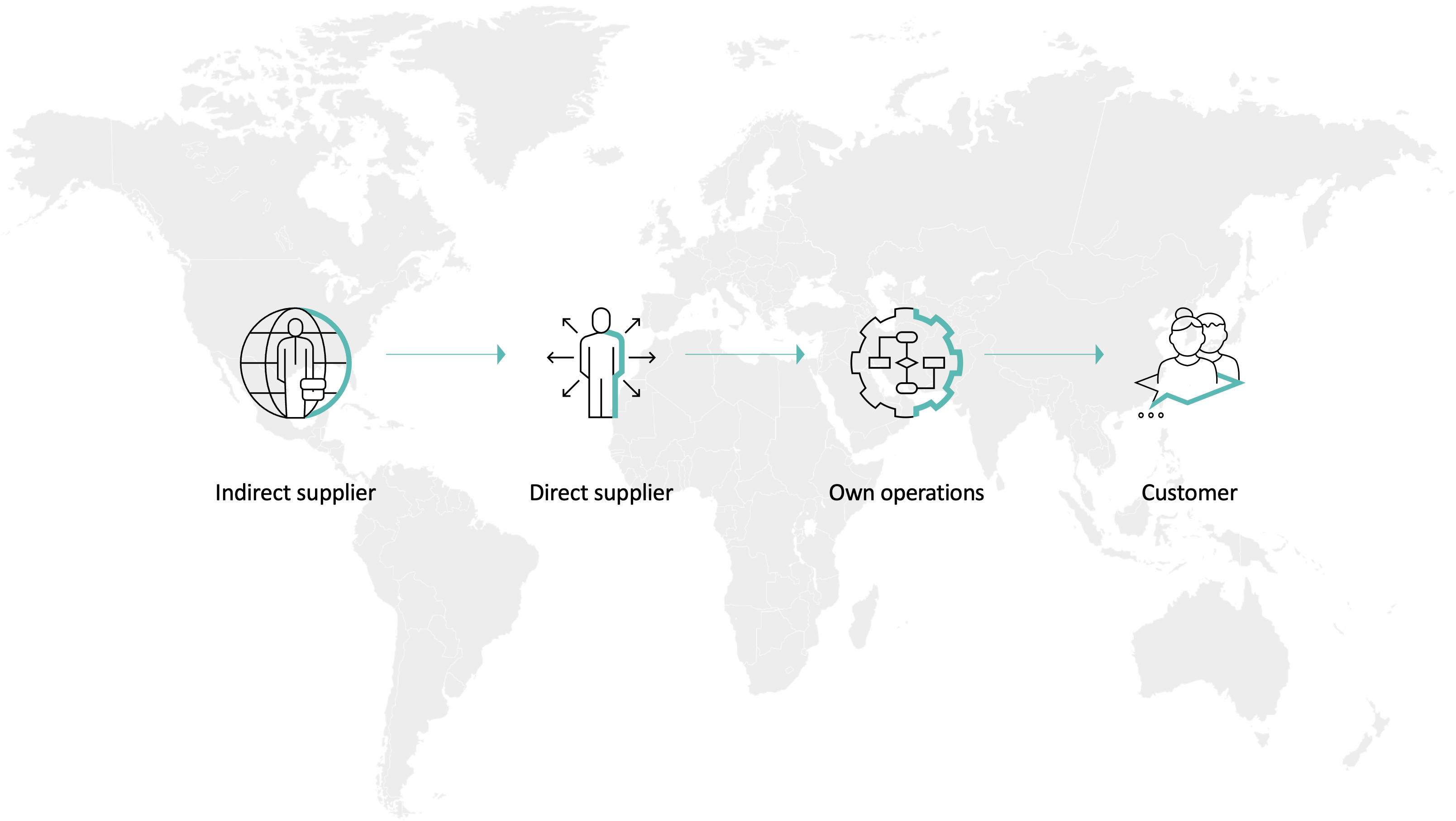
- The definition of a supply chain includes the company’s own business, indirect and direct suppliers inclusive of their services, merchandise and products across their value chain both at home and abroad.
- The supply chain includes all steps from the extraction of raw materials to the delivery of merchandise, services or products to end customers.
Supply Chain Impact
- Supply chains are becoming increasingly complex, accounting for over 90% of environmental impacts in industry around the globe.
- In 2022, 28 million people worldwide were affected by forced labour.
- In 2022, 160 million children were engaged in child labour; whereof 79 million were performing hazardous work.
- Trade unionists were killed in eight countries, 42% of countries denied or constrained freedom of speech and assembly, workers experienced arbitrary arrests and detentions in 46% of countries, and 65% of countries denied or restricted workers access to justice.
Responsible Supplier Selection and Engagement
We verify and monitor supplier compliance through a formal assessment process.
- Condition on purchase orders: Purchase Orders are mandatory (with potential exception of small procurement volumes which might not be covered by explicit procurement contracts) and must include commitment to The Adecco Group Third-Party Code of Conduct in the conditions of purchase.
- Supplier Assessment, Qualification and Onboarding: The supplier onboarding process is initiated by The Adecco Group’s Procurement team. Suppliers must pass several requirements in our qualification process, including commitment to our Third-Party Code of Conduct and participation in the Third-Party Risk Assessment.
- Supplier Evaluation and Monitoring: We evaluate and monitor our supplier portfolio regularly for ESG risk factors, inherent risks from operations and production, and exposure to those risks. The frequency is based on a risk-based approach, to ensure our due diligence is carried out in a manner that is commensurate with the products and services that we buy. This includes recurring screenings, health-checks, risk assessments, and supplier base optimizations. See "Our Third-Party Risk Management (TPRM) Approach" below for more details.
- Contracting: All new and extended/renewing procurement contracts must include the contract clause which commits the supplier to our Third-Party Code of Conduct and, additionally, defines self-assessment and audit rights.
- Supplier diversity: We believe that a diverse and inclusive supplier-base benefits us by bringing different perspectives, innovative solutions, and a resilient supply chain. As such, we are committed to exploring opportunities to promote, increase, and improve the business participation of qualified underrepresented business enterprises in our procurement process, including but not limited to women, ethnic minority, LGBTQ++, disabled, and/or veteran owned small businesses.
Our Third-Party Risk Management (TPRM) Approach
Our TPRM Framework is based on some guiding principles to ensure a holistic and standardized approach
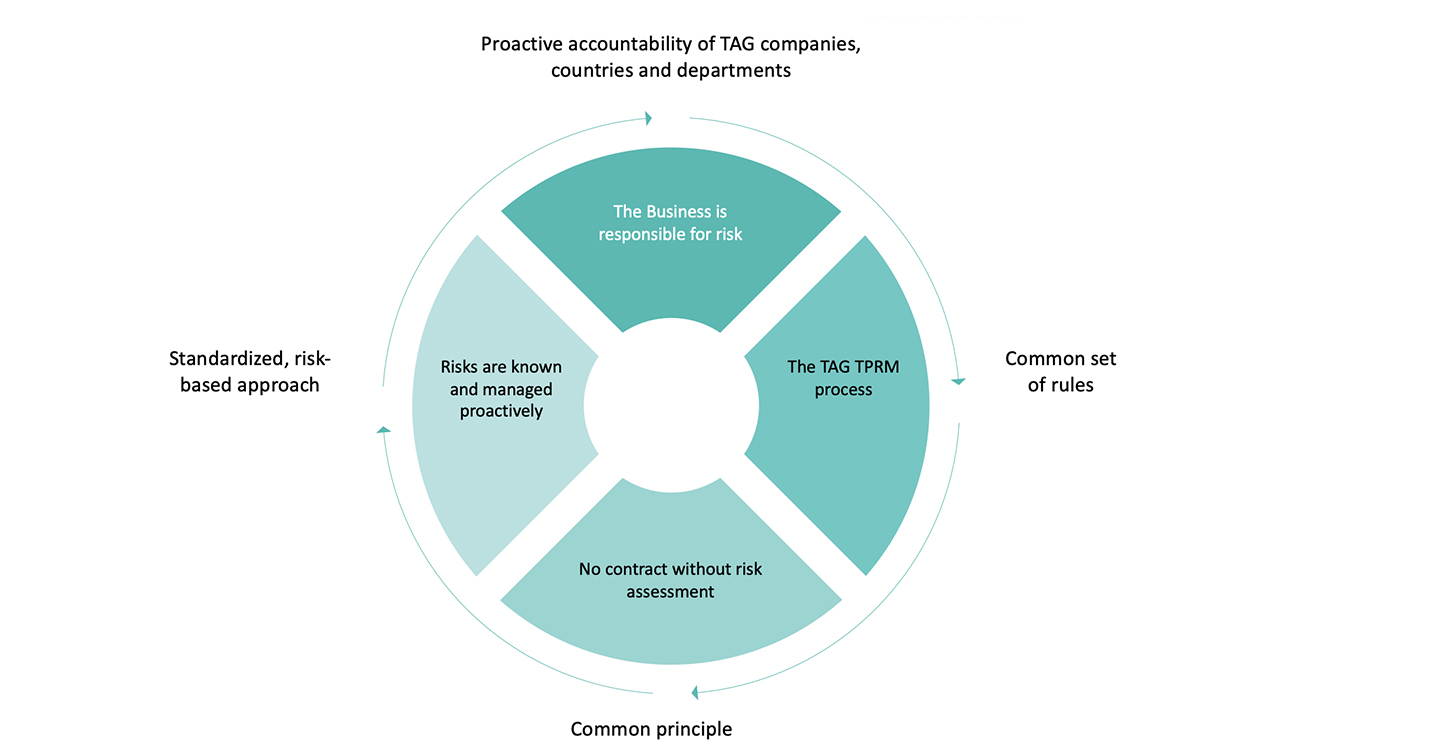
TPRM Process
Third-Party Risk Management is the process of identifying and mitigating risks introduced by Third-Party vendors via frameworks, policies, and procedures.
- Identify risks: before onboarding a supplier, it is important for us to conduct an initial risk assessment as part of our decision-making. We conduct a basic risk assessment of the supplier and the nature of their product or service to gain a more comprehensive picture of the potential risk profile and thus reduce the likelihood of unknowingly taking unwanted risks.
- Analyse and assess risks: the identified risks are categorized using The Adecco Group Risk Catalog, a library of the most common risks that may arise due to our business model. We assess supplier risk based on their inherent risk profile by applying a risk-based tiering approach. Based on the supplier's risk profile, the risk assessment can include multiple risk areas such as compliance, ESG, IT risk, data protection, and others.
- Plan action: based on the analysis, appropriate remediation plans and steps are planned.
- Implement: Risks must either be eliminated or mitigated. This is done by subject matter experts who define the necessary risk mitigation measures and monitor their implementation.
- Measure, control and monitor: suppliers can be involved in several evaluation rounds to ensure continuous evaluation and to be able to continuously mitigate risks. Changes in the supplier profile, the relationship or, for example, regulatory changes can trigger a reassessment. Our supplier portfolio is continuously monitored to ensure that commitments are met and that The Adecco Group and its stakeholders are not exposed to undesirable risks.
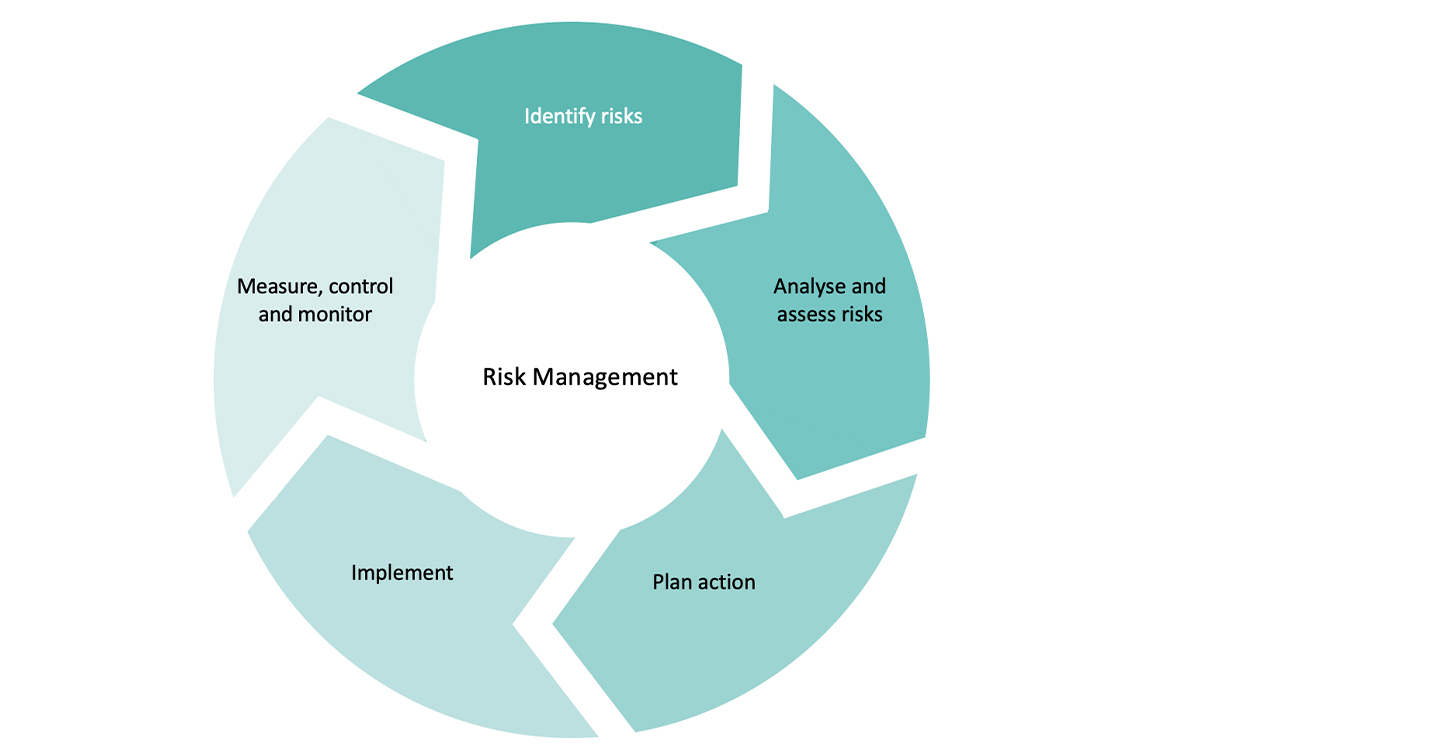
Our Third-Party Risk Management (TPRM) Risks Areas in Scope
- Economic Crime
- Sanction Risk and Export Control
- Health and Safety Risks
- Labour Risks
- Human Rights Risks
- Data Privacy/Security Risks
- IT Security Risks
- Conflict of Interest
- Compliance
- Financial Risks
- Country Risks
- Environmental Risks
Regulatory, reputational risks and Business Continuity are included in all the areas above.
Environmental, Social and Governance (ESG)
Our approach towards ESG Risk Management
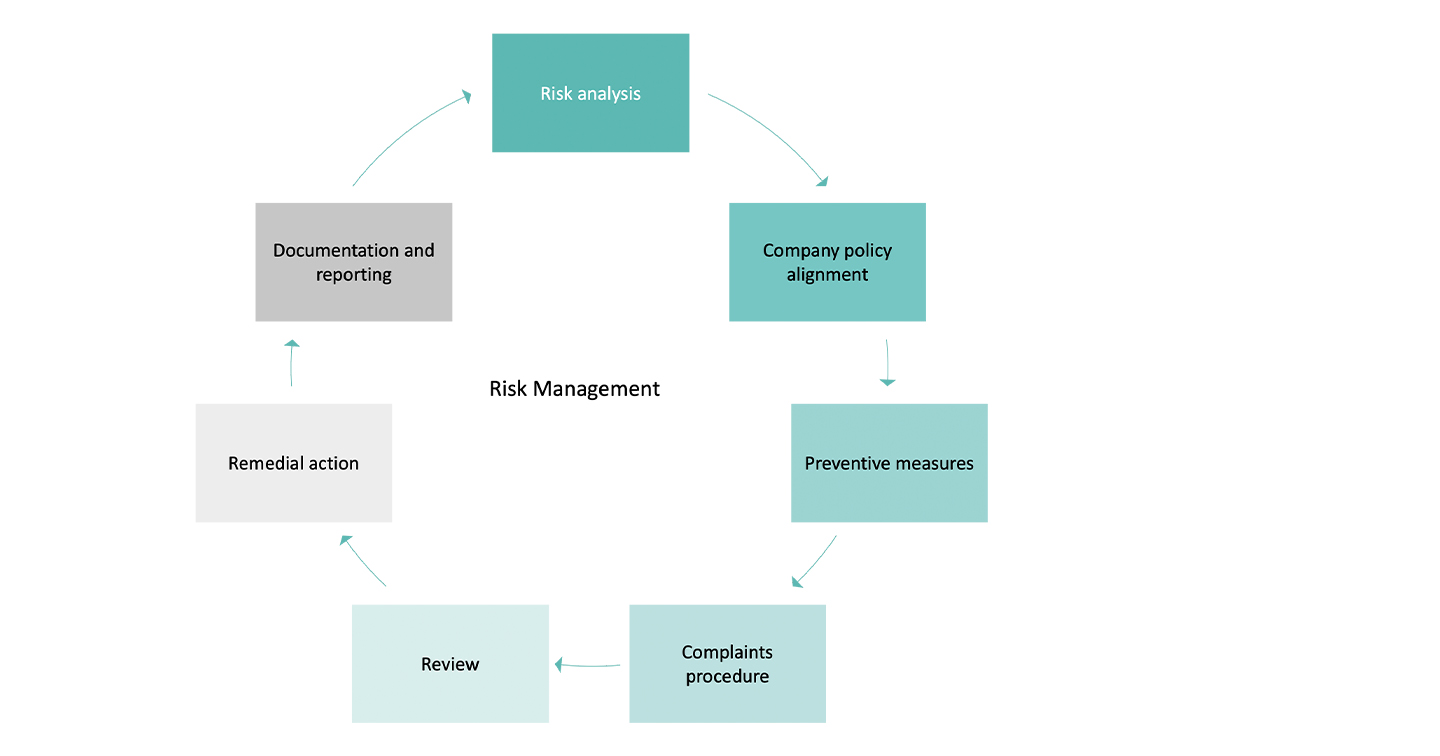
Environmental Risk
Risk of a Third Party contributing to environmental degradation and negative climate impacts (e.g. due to lack of appropriate environmental risk management and continuous improvement plans in place) and thus risk of non-compliance with/violating our own commitments and targets and contractual requirements, potentially leading to negative impact on reputation, fines, and/or loss of business.
Environmental conservation involves the protection, preservation, and restoration of ecosystems and natural resources. It is essential for maintaining biodiversity, mitigating climate change, and ensuring the long-term well-being of both humans and the planet.
Environmental Law
On July 28, 2022, the United Nations General Assembly made a resolution, according to which everyone on the planet has a right to a clean, healthy, and sustainable environment.
- General Assembly resolution 76/300 of 28 July 2022
Violations
- Violations against the provisions of the Minamata Convention prohibiting production of mercury-containing products, the use of mercury compounds in manufacturing processes and mandating treatment of mercury waste as defined by the Minamata Global Convention
- Violations against the production and/or use of persistent organic pollutants (POPs) within the scope of the Stockholm Convention as well as the non-environmentally sound handling, storage, and disposal of waste
- Violations against import and export of hazardous waste as defined by the Basel Convention on the Control of Transboundary Movements of Hazardous Wastes and their disposal; additionally, the law prohibits the import and export of other wastes from a non-party to the Basel Convention
Human Rights Risks
Human rights are the rights we have simply because we exist as human beings – they are not granted by any state. These universal rights are inherent to us all, regardless of nationality, sex, national or ethnic origin, colour, religion, language, or any other status.
They range from the most fundamental – the right to life – to those that make life worth living, such as the rights to food, education, work, health, and liberty.
The Adecco Group considers respect for human rights to be a prerequisite for all activities.
Human Rights
“All human beings are born free and equal in dignity and rights. They are endowed with reason and conscience and shall treat one another in a spirit of solidarity.”
- Universal Declaration of Human Rights (UN), Article 1 (Liberty, Equality, Solidarity)
Violations
A human rights violation is the disallowance of the freedom of thought and movement, to which all humans legally have a right. Anyone should speak up to detect and prevent human rights violations. This does not only apply to stakeholders in The Adecco Group, but also you as a supplier must inform yourself regularly and ensure this information is passed on to your employees/colleagues, see also The Adecco Group’s “Third-Party Code of Conduct”.
If a possible human rights violation is suspected or detected, you should speak to your responsible supervisor or report this matter directly and anonymously over The Adecco Group Ethics Website.
Governance Risk
Risks of a Third Party disregarding and or violating sustainable business practices, regulations, laws, standard and ethical issues.
Governance Principles
The UN Global Compact’s Principles relating to labour and anti-corruption are:
- Principle 3: Businesses should uphold the freedom of association and the effective recognition of the right to collective bargaining
- Principle 4: The elimination of all forms of forced and compulsory labour
- Principle 5: The effective abolition of child labour
- Principle 6: The elimination of discrimination in respect of employment and occupation
- Principle 10: Businesses should work against corruption in all its forms, including extortion and bribery.
Violation
- Company’s lack of ability to be resilient to volatility, including economic and weather-related events
- Non-adherence to regulatory requirements and absence of liabilities
- Non-adherence to formal governance structures via pursuit of certifications
- Inadequate accountability measures present in company’s Board of Directors
- Lack of/not sufficient commitment to conducting ethical business practices
- Lack of/not sufficient commitment to operating in a transparent and accountable manner
- Absence and/or use of appropriate channels for shareholder to enact rights
Our Expectations
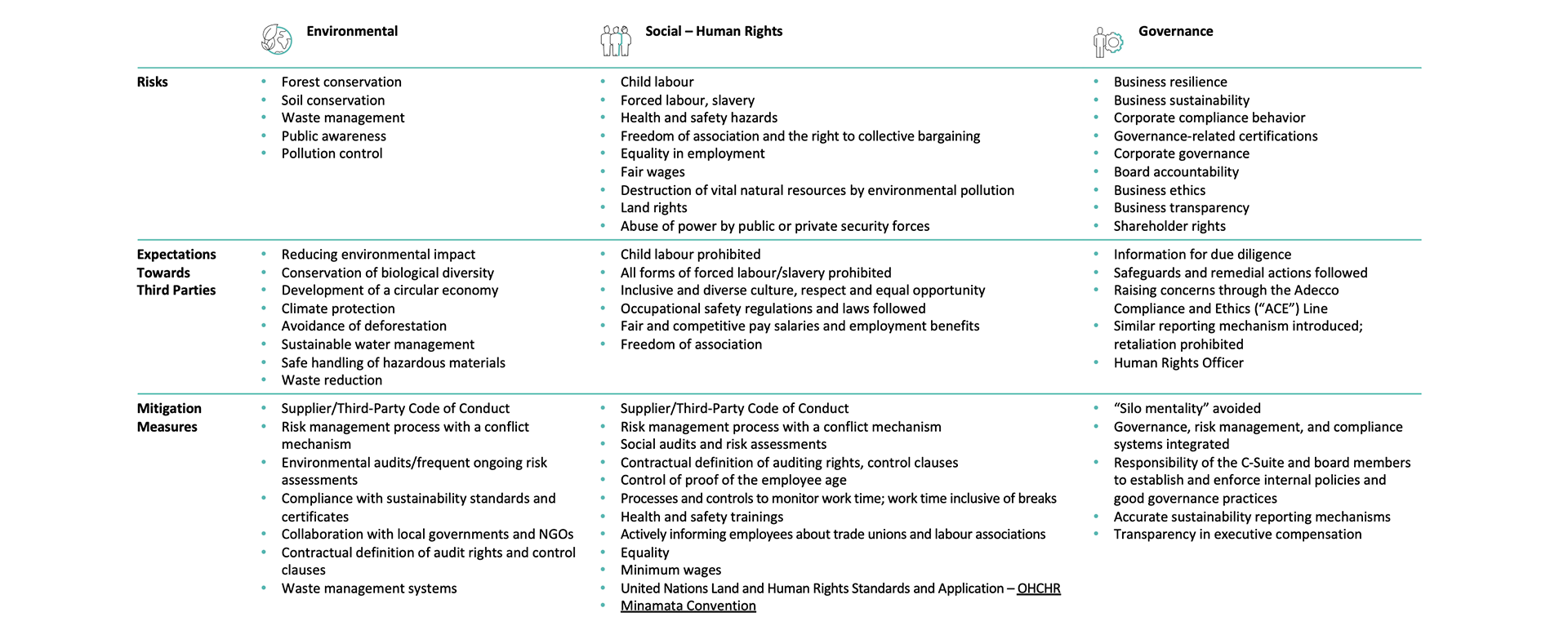
Human Rights Officer
To ensure that the position of Human Rights Officer is successfully implemented, it is important to clearly define the officer’s role and tasks within the group and the group’s due diligence processes:
- Internal coordination: the human rights officer shall act as the interface between the management and the operational side of human rights due diligence. This way, the topic is anchored at the highest management level at group/entity/GBU, as required under the GSCA.
- External communication: the human rights officer shall play a significant role in communicating to stakeholders and the public the progress made by the group in terms of its work on human rights and the environment.
- Implementation of the human rights and environmental policy: the human rights officer shall be the first contact person when it comes to the content and implementation of a group’s human rights and environmental strategy, enshrined in its policy statement. Therefore, the group’s executive management shall enable the human rights officer to acquire all the necessary expertise in this field and to equip them with the necessary resources. This is vital to ensure that human rights due diligence is appropriately implemented in “all relevant business processes”, as stipulated by the GSCA. The human rights officer shall encourage a continuous process of learning, to ensure the group can progress in implementing ever more effective measures.
- Documentation and reporting: to address the supervisory authority’s (BAFA) specifications on the reporting requirements, the human rights officer shall play a meaningful role in gathering, processing, and publishing reports on a company’s progress regarding human rights due diligence. This is also necessary for complying with regulatory oversight.
TAG Human Rights Officers
The Group has implemented the Human Rights Officer responsible for internal coordination, external communication and implementation of the Group's human rights and environmental policies.
- The Adecco Group: SVP Sustainability and ESG, Karin Reiter
- The Adecco Group Germany and The Akkodis Group Germany: Head of Sustainability, Janine Bischoff
Grievance mechanisms
We respect the right of all workers to speak up and raise grievances without fear of retaliation.
